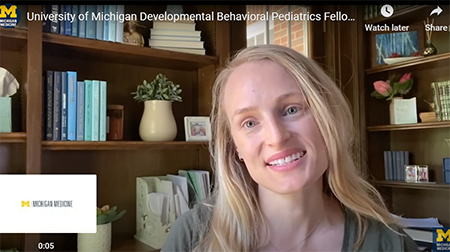Fellowship Director:
Barbara T. Felt, M.D.
Mission and Overview
The University of Michigan Fellowship in Developmental Behavioral Pediatrics (DBP) is a three-year program that fulfills the requirements of the American Board of Pediatrics Sub-board of Developmental-Behavioral Pediatrics. It is accredited by the Residency Review Committee of the Accreditation Council for Graduate Medical Education. This program is one of twelve HRSA-MCHB funded fellowships.
The goal of this program is to train future leaders in academic developmental behavioral pediatrics. This is accomplished through a broad range of clinical experiences, a comprehensive research training curriculum, and opportunities for teaching and advocacy. Clinical training in DBP spans all three years of fellowship but is a focus in one year. This training includes inter-disciplinary clinics with diverse patient populations. Research training is provided through intensive mentoring around a topic selected by the fellow, and supplemented by a comprehensive didactic curriculum in an interdisciplinary setting.
Our DBP fellowship seeks to support the training of diverse learners who seek to embrace the clinical care needs of diverse patient populations. Our institution supports this effort through resources which are outlined in the following: https://ohei.med.umich.edu/ A growing number of Michigan Medicine off-site locations, as well as partnerships and joint ventures with other institutions, extend training options at Michigan for some programs.
Clinical Training
Clinical training occurs in outpatient settings and utilizes the rich and unique resources available at Michigan Medicine. This training involves DBP faculty in primary and interdisciplinary clinic models. Other disciplines also participate in fellow training and include adolescent medicine, child abuse and neglect, child and adolescent psychiatry, genetics, pediatric neurology, pediatric psychology, pediatric surgery, and physical medicine rehabilitation. The purpose of the clinical portion of training is to develop fellows’ skills in order to provide comprehensive clinical care for children with developmental-behavioral conditions. Our clinical experiences include evidence-based evaluation, treatment, education and intervention for conditions such as ADHD, Autism, Developmental Delay, Elimination Disorders, Fetal Alcohol Spectrum Disorders, Fragile X and other genetic conditions, Neonatal Intensive Care Unit Follow up, School Problems and Sleep Disorders.
Research Training
Research Training is a major focus of the UM DBP Fellowship Program. The overall goal of this training is to provide fellows with outstanding mentoring and support to study a research topic of their choosing. The fellow can be guided towards the selection of their research topic.
Our overall goal is to increase the number of developmental behavioral pediatricians engaged in research. Although this fellowship program may be of particular interest to those with prior exposure to research, applicants without prior experience in research are also strongly encouraged to apply and may particularly benefit.
Training in Education
Strong skills in teaching and leading education programs are essential components of leadership in developmental behavioral pediatrics. Fellows in our program receive specific training in the development of didactic lectures for residents, medical students, and community members on topics related to DBP. Fellows have the opportunity to mentor undergraduate or medical students in research if they wish. Fellows also participate in clinical teaching and organization of the resident and medical student rotation in DBP. The overall goal is to ensure that our graduates are prepared to provide outstanding teaching in DBP, a key requirement of faculty positions in the field.
Advocacy Training
Advocacy is also an essential component of leadership in DBP. Fellows in our program receive both experiential learning in advocacy through our strong linkages with Title V programs, Children with Special Health Care Needs (CSCN), and the State AAP. During the clinical training year, fellows will learn about advocacy from faculty mentors and have opportunities for advocacy projects locally or at the state level.
Fellows also participate in the education of medical students and residents and in community outreach. We expect that graduates of our fellowship will lead future innovations in DBP and educate the next generation of clinicians and researchers in the field.
The University of Michigan offers competitive salaries and benefits to our residents/fellows. An overview of salary, benefits and employment eligibility is available on the GME Office website, under “Prospective Residents/Fellows.”
Eligibility and Selection
Eligible candidates will have either a M.D. or a D.O. degree and will have successfully completed a three-year residency in Pediatrics from an ACGME accredited program. Applicants must be a U.S. citizen or permanent U.S. resident.
University of Michigan Graduate Medical Education: Prospective Residents & Fellows




